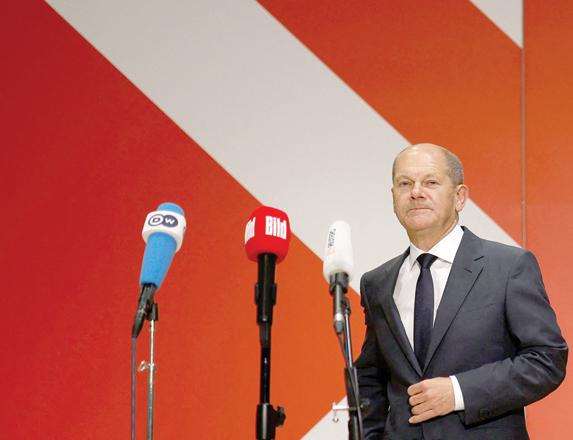You are here
'Heavyweight agenda' exposes divisions in German coalition talks
Oct 26,2017 - Last updated at Oct 26,2017

German Chancellor and leader of the Christian Democratic Union (CDU) Party, Angela Merkel (centre) casts her vote to elect the parliament leader during the first session of the newly-elected parliament on Tuesday at the Bundestag (or lower house of parliament) in Berlin (AFP photo)
BERLIN — Parties holding coalition talks in Germany faced an early test of their willingness to compromise on Thursday, with politicians from all three camps signalling that deals on immigration and climate policy would be tough to reach.
Chancellor Angela Merkel is trying to unite her divided conservative alliance, which suffered bruising losses in a national election last month, in a pact with two other parties that is untested at federal level.
Politicians say it could take months to form the coalition, leaving Germany politically weakened as the European Union looks to its wealthiest country for leadership on governance reform within the bloc.
In the first two rounds of talks, the CDU/CSU conservatives, the pro-business Free Democrats (FDP) and the Greens defied expectations by on Tuesday finding substantial common ground on fiscal policy.
But as further talks got under way on Thursday there were signs of a rethink in process. "We only set out [fiscal] goals," the Greens' Juergen Trittin told Bild newspaper.
Arriving for the negotiations, Alexander Dobrindt — negotiator for the Bavaria-based conservative Christian Social Union (CSU) — said he was far from sure that they would be as successful on Thursday's "heavyweight agenda".
That includes immigration, potentially the most divisive topic after many blamed the conservatives' election setback on the open-door refugee policy that Merkel implemented through 2015 and into 2016.
"Without limits on immigration, Jamaica will remain an island in the Caribbean but will certainly not be a coalition in Berlin," Dobrindt said. "What happened in 2015 must never be repeated."
The three-way coalition, which has governed at regional level, is so named because the parties' colours match the Jamaican flag.
Germany's demographic landscape changed overnight in 2015 after Merkel, in the face of refugee flows on a scale not seen since World War II, opened its borders to more than a million migrants fleeing war in the Middle East and Africa.
While some hailed the decision as a humanitarian act, many in her camp blame her for the subsequent surge in the anti-immigration Alternative for Germany party, which took seats from her bloc.
While Merkel's Christian Democrats (CDU) and the CSU have agreed to limit migration, many experts say an absolute cap on refugee numbers would violate the German constitution.
The Greens want to maintain a more generous immigration policy, are advocates of closer European integration — opposed by the FDP — and are adamant that Germany stick to all climate targets.
"I understand it hurts if parties can't implement promises they made in the election campaign," said Greens co-chief Cem Ozdemir. "We have to explain to people that some of those promises were dreams and now it's reality."
For Wolfgang Kubicki of the FDP, a potential candidate for finance minister, closing that gap may be problematic.
"There is a lack of basic trust between the negotiating parties," he said.
Related Articles
FRANKFURT — Germany inched towards a government led by Olaf Scholz after the Greens and the liberal FDP party said Wednesday they would try
BERLIN — The search for German Chancellor Angela Merkel's eventual successor begins in earnest this week, as her centre-right CDU Party open
BERLIN — Olaf Scholz's hopes of forming Germany's next coalition government were given a boost Wednesday with congratulations from outgoing


















